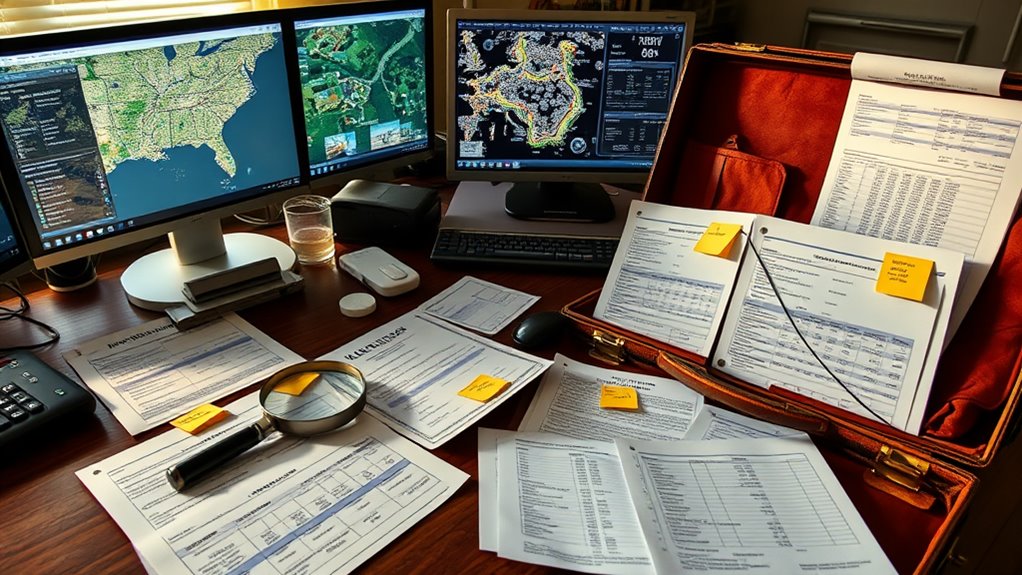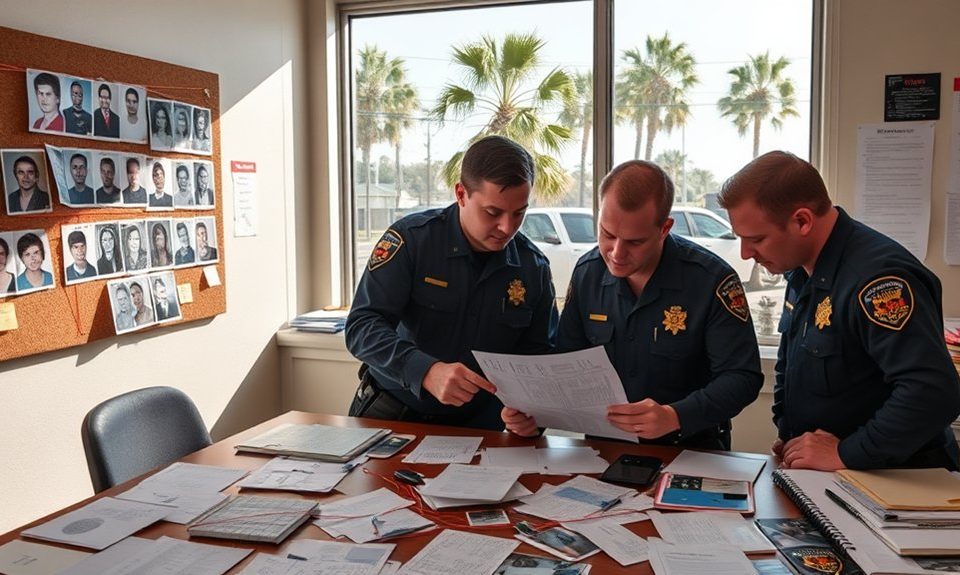To uncover hidden legal assets, individuals should conduct thorough financial investigations, utilize public records and databases, engage a forensic accountant, investigate social media and online presence, and collaborate with legal professionals and private investigators. Financial audits and asset tracing can reveal discrepancies and concealed assets, while public records can provide insights into ownership and liabilities. Expert assistance further enhances recovery efforts. Further strategies for asset identification may be detailed in subsequent exploration.
Key Takeaways
- Conduct thorough financial investigations to trace asset flows and identify concealed properties or investments.
- Utilize public records and databases to uncover ownership details, court disputes, and financial obligations.
- Engage a forensic accountant to analyze financial statements and identify discrepancies indicating hidden assets.
- Investigate social media and online presence for clues about undisclosed investments or properties.
- Collaborate with legal professionals and private investigators to enhance asset discovery while ensuring compliance with regulations.
Conduct Thorough Financial Investigations

Conducting thorough financial investigations is essential for uncovering hidden legal assets. These investigations often involve meticulous asset tracing, where financial specialists track the flow of funds to identify concealed properties or investments. Financial audits play a critical role in this process; they scrutinize financial records for discrepancies that may indicate undisclosed assets. By analyzing bank statements, transaction histories, and investment portfolios, investigators can build a clearer picture of an individual’s financial landscape. This methodical approach not only reveals hidden assets but also establishes a foundation for legal recourse if necessary. Ultimately, the precision and objectivity of financial investigations empower individuals and organizations to reclaim what is rightfully theirs, ensuring justice in the management of assets. Additionally, utilizing specialized tools can enhance the effectiveness of these investigations.
Utilize Public Records and Databases
Utilizing public records and databases is a pivotal strategy in the pursuit of uncovering hidden legal assets. These resources offer a wealth of information that can reveal ownership and financial status. Key areas to explore include:
- Property Deeds: Investigating property deeds can reveal real estate holdings and associated financial liabilities.
- Court Records: Reviewing court records can uncover legal disputes or judgments that may indicate hidden assets.
- Business Filings: Analyzing business registration documents can identify ownership in corporations or partnerships.
- Tax Records: Accessing tax records provides insights into income and property taxes, highlighting possible undisclosed assets. Additionally, thorough background checks can help ensure that any claims made in these records are verified, reducing risks associated with careless hiring.
Engage a Forensic Accountant
Engaging a forensic accountant can greatly enhance the process of identifying hidden legal assets. These specialized professionals employ forensic techniques that are essential for uncovering discrepancies in financial statements and identifying unreported income. Their expertise in asset tracing allows them to follow complex financial trails, revealing assets that may be concealed within intricate corporate structures or through offshore accounts. By meticulously analyzing financial records, forensic accountants can provide insights that are often overlooked by traditional accounting methods. This thorough examination not only increases the likelihood of asset recovery but also adds a layer of credibility to any legal proceedings. Ultimately, enlisting a forensic accountant can be a valuable investment for individuals seeking to uncover hidden legal assets effectively. Additionally, their work can be crucial in cases involving insurance fraud investigations, where concealed assets often play a significant role.
Investigate Social Media and Online Presence

While many individuals present curated versions of their lives on social media, a thorough investigation of their online presence can reveal potential hidden legal assets. Analyzing social media platforms allows for the identification of valuable information often overlooked. The following strategies can aid in this investigative process:
- Profile Analysis: Examine profiles for mentions of businesses, investments, or affiliations that suggest hidden assets.
- Content Review: Scrutinize posts, comments, and shared content for clues about financial interests or property ownership.
- Network Examination: Investigate connections and relationships that may indicate undisclosed assets or financial activities.
- Location Tracking: Use geotags and check-ins to uncover physical assets that may not be publicly declared.
These online footprints can provide critical insights into an individual’s financial landscape, especially when considering effective investigative techniques that enhance understanding of communication patterns.
Collaborate With Legal Professionals and Private Investigators
Partnering with legal professionals and private investigators can greatly enhance the search for hidden legal assets. These legal partnerships offer access to specialized knowledge and resources that an individual may lack. Legal professionals can navigate complex regulations and provide insights into asset disclosure requirements, while private investigators employ advanced investigative strategies to uncover concealed assets. They utilize techniques such as surveillance, background checks, and financial analysis, guaranteeing a thorough approach. Additionally, private investigators play a crucial role in ensuring the admissibility of evidence in court, which is vital for asset recovery efforts. Collaborating with these experts not only improves the chances of locating hidden assets but also guarantees adherence to legal standards, minimizing potential liabilities. Ultimately, this alliance fosters a more detailed investigation, empowering individuals to reclaim their rightful assets with greater confidence and efficacy.
Frequently Asked Questions
What Types of Assets Are Commonly Hidden During Legal Disputes?
During legal disputes, individuals often conceal hidden properties and undisclosed accounts. Such assets may include real estate, offshore accounts, or investments, complicating the resolution process and necessitating thorough investigation to uncover potential financial discrepancies.
How Can I Ensure Confidentiality During Asset Investigations?
To guarantee confidentiality during asset investigations, employing confidentiality agreements is essential. Additionally, utilizing discreet investigation techniques minimizes exposure, safeguarding sensitive information while maintaining the integrity of the process, thereby fostering trust among involved parties.
What Are the Costs Associated With Hiring a Forensic Accountant?
The costs associated with hiring a forensic accountant typically include forensic fees and expenses related to accountant services. These costs can vary considerably based on the complexity of the investigation and the accountant’s expertise and reputation.
How Long Does It Typically Take to Uncover Hidden Assets?
The asset discovery timeline varies greatly, typically ranging from weeks to several months. The investigation duration depends on complexity, available information, and cooperation levels, ultimately influencing the speed at which hidden assets can be uncovered.
Are There Legal Consequences for Hiding Assets?
Asset concealment can lead to significant legal ramifications, including penalties, fines, or even imprisonment. Courts take such actions seriously, as they undermine the integrity of legal proceedings and equitable distribution of resources in disputes.
Conclusion
To summarize, uncovering hidden legal assets necessitates a multifaceted approach that combines thorough financial investigations, the utilization of public records, and the expertise of forensic accountants. Additionally, exploring social media and online presence can provide critical insights, while collaboration with legal professionals and private investigators enhances the effectiveness of the search. By employing these strategies, individuals can greatly improve their chances of identifying concealed assets, ultimately supporting their legal and financial objectives.






